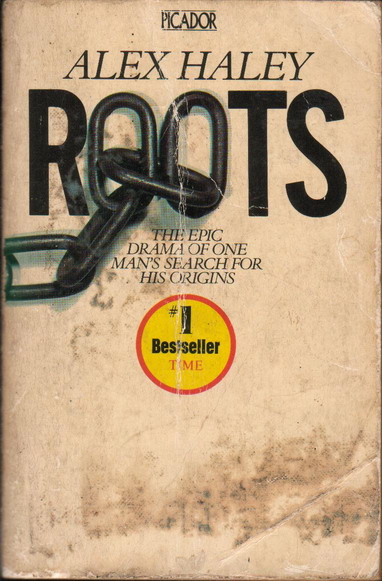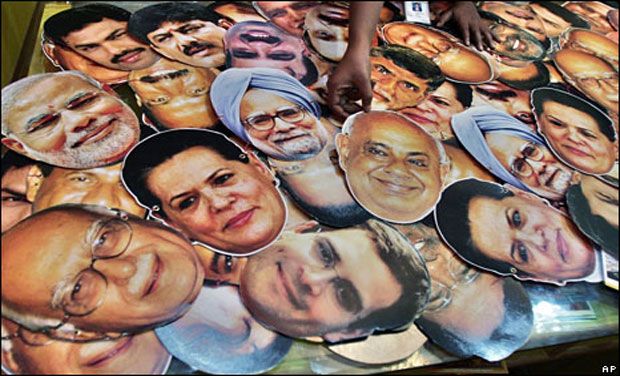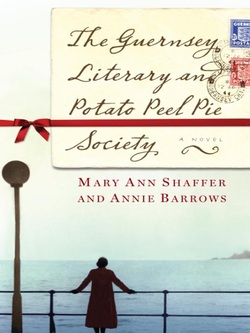|
Author: Alex Haley
Genre: Fiction Tags: Realistic. Historical. Poignant. Human lives often makes for the most interesting stories and Roots is no exception. This is the story, or rather the history, of one family. It starts seven generations back, with the first ancestor, Kunta Kinte. He is a young boy living with his family in a Gambian village in Africa in the 18th century. He is captured by white slave hunters and brought to America. He tries to escape several times, with brutal consequences. Finally, he is resigned to his fate. Later, he marries and has a daughter, but his deep hatred for the white race always remains, and with good reason too. The book recounts the story of his daughter, her children, their children, and so on and so forth until it ends with the author himself. The African words and tales from Kunta Kinte had been handed down through each generation, connecting all of them to their origins. This however, forms just the background narrative of the book. The main story recounts the lives of slaves on the white-owned plantations, their work, their families, their struggles for survival, identity and freedom. At times, the oppressed identifies with the oppressor. We see the attitudes of both black and white communities to one another. The story weaves in and out of important moments of American history, such as the abolition of slavery. It is a fascinating, and at many moments a heart breaking read. This is the best and worst of human nature told through one long family story.
0 Comments
Phew! It’s been a hot summer in more ways than one. Besides slurping mangoes and sweating buckets, we Indians actually came out in droves and voted.
We often feel that we are a divided country. We’re just too big, too populated, and too diverse to actually feel like one nation. But this time there was something common amongst all Indians, across the length and breadth of the land. We were all totally fed up with our last Government. Everyone unanimously felt that enough is enough. Now why we were so fed up is another story altogether (more than a story actually, it can form a series of books). But it was a new experience to see everyone throw their vote behind one man. Congress made desperate last-minute barbs by calling him ‘chaiwalla’, and referring to a 56 inch chest, but in the end they had to put their tail between their legs and run for cover, because the people of India gave them a good, solid, well-deserved kick. It feels great that they’ve been squashed (for the present at least), like that lazy, disgusting cockroach that lurks in the corner of your kitchen. Because of all this polly-tickle tamasha, one watches a lot of news these days. You can’t see a minute of news without hearing the name ‘Modi’. It’s the most used word after the phrase ‘India needs an answer’. If someone actually did a statistical tally, the word ‘modi’ would be occurring at the frequency of one per minute at a bare minimum, and even going up to twenty-seven per minute on a good day. Because even when people are not talking about Modi, they are talking about Modi. You can’t discuss anything without his name popping up. Government, corruption, dhoklas, Gujarat, Hindus, Muslims, kurtas, puppies, and everything connects to Modi somehow. You’ve got to hand it to the guy for become Brand No. 1. During the last six months or so, family/friends get-togethers could not proceed as normal. The room would be firmly divided into pro-Modi and anti-Modi factions. Everyone would be shouting their opinion without hearing anothers’. Each camp is firmly entrenched in its belief, and it’s impossible to budge them either way. There are spouses, siblings, parents and kids who don’t see eye-to-eye on this. But we forget an important thing. We have to thank the Congress party. Why? If they hadn’t put up a goofy like RaGa, who knows, they might have got a bigger majority, and would not be shaking in their shoes today. Imagine if they had a smart, shrewd, capable leader. It would be terrible, because they might continue in power for the next sixty years, reducing India to pulp. Their miserable governance actually united this country, which otherwise can’t agree on which MDH masala is best. Now I've never been a hard-core Tarantino fan. I've seen Pulp Fiction, and thoroughly enjoyed it. I've watched bits and pieces of both Kill Bills, wincing as blood flew. But his last two movies have been wonderful, perfect movie-watching experiences. The one that really made me a fan is of course, that glorious piece of film-making called Inglorious Basterds. From the opening scene, it gets you in it's grip, and it doesn't let you go. It's story is perfect, and more importantly, it's perfectly told. QT knows what to tell you, what to show you, and when to show it to you.
Many people don't like Tarantino films because of their graphic violence. Indeed, they are not for the faint-hearted. If bullets and blood flying, people getting their genitals blown to bits, and dogs tearing people apart is not your cup of tea, don't venture into this territory. You've been warned. I'm not a fan of extreme violence. But I didn't seem to mind it in these movies. It's the tale of revenge, the story of how the oppressed rises up one day, and gives it back to the oppressor, it's the underdog becoming top-dog, and it leaves the audience cheering for more. The best part is, it's not the scenes of violence that really stay with you. It's the other, far more subtle things that get stuck in your head. One of the best scenes in Inglorious Basterds is when Shoshanna, meets Colonel Hans Landa in the Nazi officers club, for the first time since he shot her family to pieces. Inglorious Basterds unfolds like a book, slowly, revealing a complex plot. At the end of the movie you are left wishing something like that really happened in World War 2. Django Unchained is set in America before the civil war. Unlike Inglorious Basterds, it's plot and story is very simple and straightforward. Perhaps for this reason, some people may not like it, but this is it's chief charm. Django may have a simple story, but it makes up in the richness of its characters. They are endlessly entertaining. They are human, there is something that breaks each of them at different points. There are some traumatic scenes of violence such as a horrendous wrestling match, dogs tearing a slave to pieces, and other such scenes. But there are some remarkable moments. One is when Django's wife is brought out of the hot-box, where she has been kept as punishment for trying to run away. You will rarely see a film showing a naked, shamed woman, without showing nakedness or shame. Somehow, QT masters it. There is the terrible moment when the hot-box is opened, water is thrown on her, and several white men pull her out, and literally man-handle her. This could have been a very ugly scene, but it is heart-wrenching without being explicit. It shows the cruelty, but it handles it sensitively. Another fantastic moment comes towards the end. Dr Shultz (Christof Waltz) is haunted by the scenes of the slave being torn to pieces by dogs. Until there he has maintained his strength, but suddenly, one senses the cracks appearing in his calm state of mind. He seems a character who can absorb many disturbing things, and he himself kills people without qualms, but this experience shatters something deep within him, and unravels him. If there is that one moment in life when someone can't take something anymore, this is it for him. It's a very telling moment. The audience knows that something in him has changed, and he is going to do something extreme, or crazy, but you just don't know what. It's easy to underestimate the acting talent of Jamie Foxx, because he is a man of few words in this film. But as you watch the entire film, he communicates volumes without words. Experiences have toughed him up, but they haven't made him inhuman. He's a simple man, with a simple mission. His greatest strength is he learns fast. His greatest weakness is his love for Hildi, his wife. He can bear anything, but Hildi is his Achilles' heel. Leonardo DiCaprio is perfect, charming, funny, kind but with a hard, cruel, hypocritical and almost psychotic core. His character is unveiled beautifully. Initially, you like him. He charms. Slowly, you fear and dread him. His unpredictability leaves one on the edge of the seat. Samuel L Jackson is brilliant as the faithful slave, serving a family since generations. He is so identified with his role of the servant, that he cannot believe that any black person can be anything else. He is the most annoying, cloying, racist person in the movie. Of course, Christof Waltz takes the cake, as he does in Inglorious Basterds. In both these movies he is a ruthless killer, who is delightfully cheerful and practical about his work. But in Django, he is a softer, more interesting, more nuanced character. He is the most likeable, pragmatic, person, who takes life with a pinch of salt. If one wanted a traveling companion, one really couldn't ask for a better one. He is honest, brutal, and takes things as they come. Most enjoyable, even strangely touching, is the way he takes Django under his wing. Theirs seems like an unlikely partnership. But it's the best there is. It broke my heart when they killed him. I think I could have accepted Django' death easier than his. But it was a good ending. Most amazingly well shown is the attitude that QT exposes, through the dialogues, the brilliant screenplay. The attitude that any oppressor has, he feels justified in his actions. He genuinely believes it is his birthright to oppress, to rule, to own. This belief is so strong, that even the oppressed believe it blindly. They deeply resent anyone who upsets this balance. Samuel L Jackson brings this to life. Black slaves resent a black man who is free, and who rides a horse alongside the white men. The Guernsey Literary and Potato Peel Pie Society by Mary Ann Shaffer and Annie Barrows, is a long title for a not-very-long book. Set in the time of World War II, on the island of Guernsey, a tiny little island off the coast of England, it tells the story of the islanders, and a visitor.
Due to the war, there was a great shortage of food and basic amenities. The islanders make the best of this situation, by scrimping, sharing and being really creative with the way they use their resources. The situation is worsened by the starving German soldiers who grab whatever food, drink, soap, blankets, etc they can get their hands on. At the height of war-time, this miniscule island is almost forgotten by mainland England, and with no supplies reaching them, things are really hard. Even though the situation looks bleak, the mood is not pessimistic. The islanders are good, strong, simple folk, who help each other, rally around, and keep the group's spirit flying high. One of the ways they do this is by starting a literary society, which meets often (and secretly) to read and talk about their favourite books. They are enthused enough to start writing too. The best part is, the entire book is in the form of letters, much like another wonderful book, Love Letters, by AR Gurney. Through letters traveling between the various characters, one gets personal insights into the nature of people's lives, loves and human nature. The letters gradually unravel the story, bringing forth the characters of people, and the incidents that occur. Though a work of fiction, the authenticity makes it seem like non-ficiton. Most heartening are the little things that give people joy in hard times, and how human contact is so essential to us all. One realises the value of the 'softer' things in life, such as literature in this case, and why we need it as human beings. We take it for granted till it is denied to us. The book is reminiscent of a wonderful quote by Albert Camus, "In the midst of winter I finally learned that there was in me an invincible summer." This review contains spoilers Once in a blue moon you get to see a movie that is so real, moving and brave, you can't forget it for a long time. Das Leben der Anderen (The Lives of Others) is about the suppression of artistic, literary and intellectual expression in East Germany. Any piece of writing, theatre, movie, or art is strongly controlled by the Government of the day, known as the Stazi. Any piece of work not in keeping with their propaganda, is censured and controlled to the point of complete destruction. The Stazi often resort to bugging people's homes with devices, and spying on their every word and act. The only thing that remains private are thoughts, and even they get exposed through double-crossers. An officer of the Stazi is given the job to closely watch a couple. The man is a playwright, and the woman an actress who stars in most of his works. They know what suppression has done to their close friend, a film maker, who did not abide by the rules. Stifled by the lack of any opportunity to work freely, he is completely destroyed. The Stazi dictates how any creative person tells their story, paints their paintings, makes their films, or enacts their performances. This couple still seek to find a way out for their creative voice. The officer who is listening into their every conversation in a dingy attic, begins to be strangely moved by things he hears. From being completely pro-Stazi, he goes over to the other side, in a slow progression. As a continuously falling drop of water ultimately shatters a rock, this officer's rigid beliefs are slowly broken down, one by one, as he listens to their way of life. His whole identity, his very being undergoes a transformation, proving that even in the hardest of people, there is still a human heart. The story has more plots and complexities, and is a deep tale of love, politics and double-crossing. The Stazi officers often search the couple's apartment when they are away. At one point, this officer secretly pockets a book he sees lying about. Later, at home, he opens and reads the book, a simple act that has been discouraged and almost banned by the Stazi. The beauty of the moment, when he discovers that simplest and happiest of joys, of just pure reading, is indescribable. The words on the page give him happiness, after years of being brainwashed that books are bad. There are many more such moments in the film. The playwright meanwhile gets a chance to write a story about the harsh realities of East Germany, and be published in a West German magazine, remaining anonymous all the time. He is provided with a special typewriter to do this task, in utmost secrecy. The typewriter becomes the most dangerous object in the house, for if it is found, it has dire consequences for the couple. It is almost like a deadly piece of evidence, the murder weapon, or the corpse, which the Stazi struggle to find, and no one wants to reveal. Everything revolves around it, at one point. It is a life and death situation, quite lliterally. The writer's tool becomes the most incriminating piece of evidence, for the crime of honest writing. The woman has her own struggle and anguish, as she is used and abused by the powers that be, and remains helpless through it all. She is at the mercy of a man in power. She sells her soul to buy the couple the little creative freedom that they enjoy. How far would one go for one's art? Far becomes too far at times. Tragically, the double life she leads destroys her from within, as it has done to others. Only the playwright gets the chance for meaningful contribution to his work, but he pays heavily for it in other ways. Lives are lost for creative expression, something which is taken for granted many a time. Yet, in an culture of animosity and supression, a hard-headed officer begins to trust again. |
Archives
June 2018
Categories
All
LinksThe New Yorker Old Blogs |



 RSS Feed
RSS Feed
